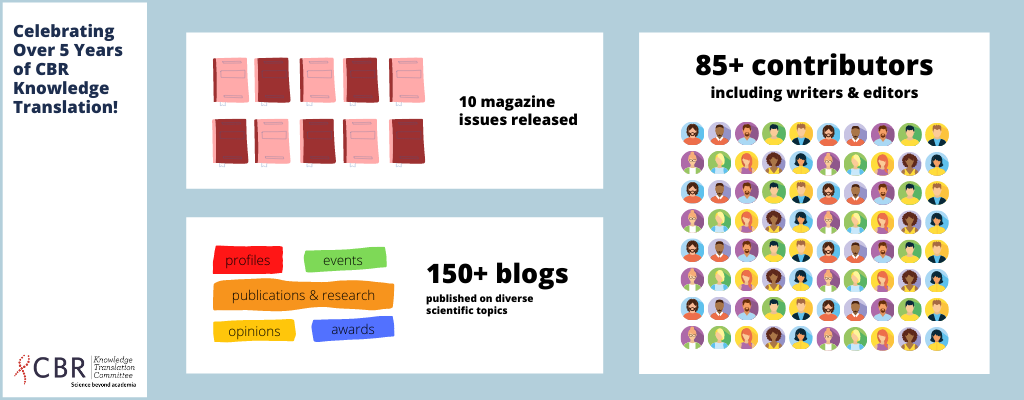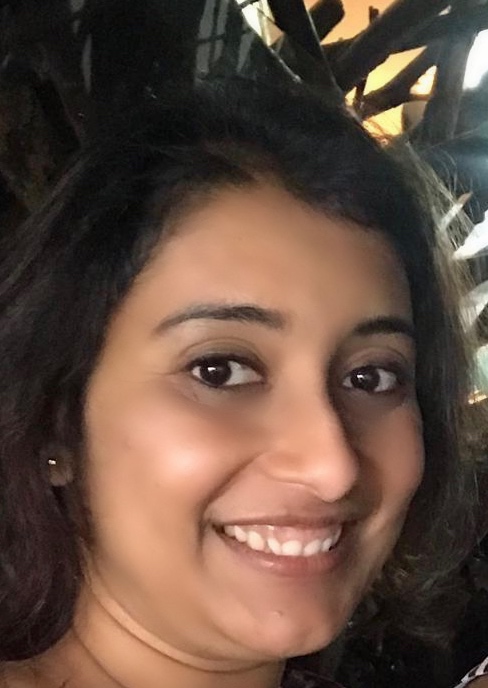
With the release of our 10th magazine issue, the CBR Knowledge Translation (KT) Committee is excited to celebrate over 5 years of ongoing knowledge translation!
Founded in January 2015, the CBR KT Committee is a group of undergraduates, graduate students, postdoctoral fellows, research associates, and technicians who are passionate about science writing, blogging and mixed media communications. With writers and editors who work collaboratively, the KT Committee regularly publishes blog posts. The team also produces a magazine twice a year for each CBR symposium, and works to promote publications through newsletters, relevant organizations, and social media.
Members are free to explore their interests and develop science communication skills that are meaningful to them. That includes covering publications from CBR labs, taking a deep dive into scientific opinion pieces, writing event recaps, and interviewing CBR members for profile pieces.
Take a look through these articles and you’ll uncover stories from the CBR: a fellow lab member’s first publication, events organized by GAP students over the years, how CBR Travel Awards recipients have shared their science around the globe, and chronicles of CBR social life told through pictures and words. Or perhaps you’ll see a snapshot of our Norman Bethune and Earl W. Davie Symposia, where trainee presenters, leading-edge researchers, and keen attendees gather for a single day of knowledge sharing and connection. Or maybe you’ll find a personal piece, something close to the writer’s heart – the importance of scientific mentorship, the gap for women in academia, a reflection on mental health and the grad school journey.
To hear it from our team, we reached out to a few members – both new and old, writers and editors – who shared their experiences with us.
Interested in joining the CBR Knowledge Translation Committee? Contact Kristine Ho (kristine.ho@ubc.ca).
Michael Hughes, Research Associate, McNagny Lab

Michael Hughes
You’ve been part of the KT Team since it started in January 2016. Why did you join the team, and how has your experience been?
My mother taught high school English and Literature, and as part of a youthful rebellious phase, I pretended to hate writing. At the time, I figured that I wouldn’t really need those skills to be a scientist. How wrong was I? Good communication and writing are one of the most important skills for a researcher. I joined the KT team to try to make up for my lack of focus in those years.
What are some of your takeaways from your time with the team?
I think many scientists would agree that writing for a general audience is much more difficult than writing a research article. My experience in the KT Team has taught me to emphasize the “why” of my work in both cases. The “why” makes for more compelling stories – and that keeps the reader interested!
What motivates you to participate?
I learn from every article I write and every article I edit. But I think acting as an KT Team editor has helped me the most with my own writing. I love to see different writing styles and how writers develop their points. With thoughtful, constructive feedback, a good editor can help the writer connect with the reader more effectively. I hope that practicing these skills will make me a better mentor to new writers and students.
Sarah Bowers, Junior Researcher, Brown Lab at BCCHRI

Sarah Bowers
What motivated you to join the CBR Knowledge Translation Committee?
The supportive network of writers and editors was one of the things that initially motivated me to join the team. A great thing about being a member is the opportunity to work with others to find ways to communicate complicated ideas. For junior researchers like myself, I think this sort of collaborative work is invaluable because it not only provides an opportunity to develop your own writing skills, but also encourages you to think creatively about how to provide constructive feedback.
It is a satisfying feeling to think back to where an article started and feel like we’ve managed to make it more accessible, or improved the readability after several rounds of edits.
Do you have a favourite blog article?
One of the first articles I wrote as a member of the KT team was about a visit we did as CBR Summer Students to the Canadian Blood Services in 2018. I recall being excited to report on this as I learned so many new things that day, particularly about the breadth of work done by the Canadian Blood Services. It can be gratifying to have blog articles such as this as records of special experiences.
I also enjoyed working on a piece about patient engagement in research from a youth perspective. I think finding ways to engage more youth, especially young patients whom translational research aims to benefit, is of particular importance. It motivates me to keep practising my science communication skills!
Aparna Gopal, PhD Student, Karsan Lab

Aparna Gopal
Why did you join the team, and how has the experience been so far?
While pursuing my PhD degree, along with research, I wanted to gain varied experiences to broaden my skillsets. I have always enjoyed writing and editing scientific articles, so when this opportunity to join the CBR Knowledge Translation Committee arose, I decided to join the team, where I can work on a number of different types of articles and develop my editing skills.
Working with the KT team has been a fun experience. I have had a chance to edit different kinds of articles, from interviews with PIs to magazine layouts. I feel that I learn a lot, more than just editing skills from reading these articles, and I like that.
As a scientist, why do you think writing or editing is relevant to your work?
As a grad student, I do need to write a lot about my research, be it for scholarship applications or paper publications. Although the writing format is different, what remains consistent is the need to write concisely and clearly. This is where good editing skills come into play. Moreover, being able to convey our research to lay audience is a very integral part of all scholarship applications. And developing this skill is very crucial as a grad student and a future scientist, as it is very important to highlight the significance of your research to all audiences.


